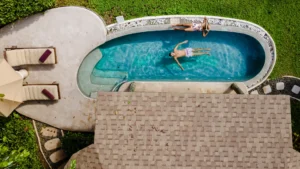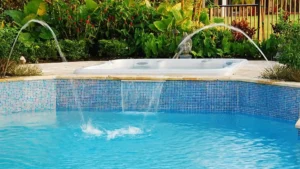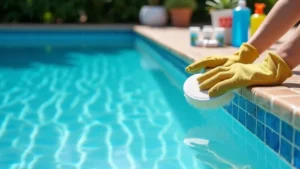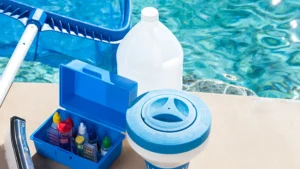
Maintaining the proper chemical levels in your pool is key to keeping the pool and the people who swim in it healthy. Plenty of things can go wrong when the chemicals are out of whack, and one of those things is the presence of hard water.
So, what exactly is hard water, and how do you prevent it? Hard Water Pool Effects can include scaling, cloudy water, and damage to your equipment. Understanding these effects is the first step to protecting your pool. And how do you decrease hardness in the pool or get rid of it if it’s already an issue?
Pool water feels hard
Hard water happens when the pool contains excess calcium and magnesium.
Based on the San Francisco Gate, pool owners should keep an eye on:
- Water hardness.
- Keep pH levels balanced.
Does water hardness matter in a pool?

Hard water can cause damage to your pool and result in white residue left on ladders, pool decks, and other surfaces. This is known as “scaling” and is the result of calcium hardening on the surface.
According to The University of Arizona, water balance is a term used to describe water that is neither scaling nor corrosive. Balanced water will dissolve the substances introduced to it, and they will remain in the water until it becomes saturated.
What is the difficulty of water in swimming pools? When the water reaches a certain temperature, it won’t be completely dissolved with additional substances; thus, it’s hard water when it is tested. Here, some major points:
- Dissolved substances may precipitate and fall out.
- Hardness may result in scale problems associated with mineral buildup.
- Soft water may be corrosive and damage plumbing and materials.
It is important to maintain a balance between hard and soft water in order to prevent these complications.
Hard water pool treatment

Treating hard water in a swimming pool can be a simple task. We suggest homeowners use available test kits to check for hard water. However, it’s best to let the experts at Amenity Pool Services handle the treatment. They operate in Phoenix, Florida, Dallas, and more. Although it may be tempting to try and fix the issue yourself, one wrong move or forgotten step and it’s time to hit the reset button so you’ll have wasted time and money.
San Francisco Gate reported that most pools need to be drained about every two years, but if you’re trying to fix a hard pool water problem it’s likely you’ll need to drain a portion earlier. To effectively manage the hardness levels in your pool water, one practical approach is to incorporate soft water into the water mixture. This addition can play a significant role in diminishing the overall hardness.
After you have added the soft water, it is advisable to conduct another water test approximately one week later. This follow-up is important. It makes sure the water is soft enough and that the hardness levels are right for good swimming.
Can hard water impact your health?
Although swimming pool water is not meant for consumption, it is quite common for swimmers to accidentally swallow small amounts of it while enjoying their time in the water throughout the entire swimming season.
A report from the National Center for Biotechnology Information says that drinking pool water, especially if it has a lot of minerals, can harm the cardiovascular system. This means that while it is important to recognize that pool water is not safe to drink and should generally be avoided for consumption, there is still a chance that someone could accidentally swallow some of this water while they are swimming.

Unintentional swallowing can cause health issues. These health concerns should not be ignored. It is important to consider the effects on well-being. It is essential to be aware of this risk while enjoying recreational activities in the pool.
Frequently Asked Questions (FAQs)
What is water hardness in a swimming pool?
Water hardness is actually an indication of the presence of calcium and magnesium minerals present in the water of your swimming pool. When their concentration becomes too high, your water becomes “hard” and leads to several problems including scaling, cloudiness, and damage to surfaces and equipment.
How do you fix hard water in swimming pools?
First, you have to test the water, then determine how hard it is. When it’s high, you can drain some of the pool water and refill it with soft water. You can also use special pool chemicals designed to lower calcium hardness. These helps keep scaling at bay and maintain clear water in your swimming pool.
How do you lower hardness in pool water?
To lower calcium hardness, you can:
- Partially drain and dilute the pool with soft water
- Use a sequestrant chemical that binds calcium to prevent scaling
- Regularly monitor with a hardness test kit
This helps restore water balance and protects your pool.
What pool chemicals help with hard water?
The most effective pool chemicals for hard water are calcium reducers, sequestrants, and stain & scale preventers. These products control mineral levels. They also prevent calcium deposits on surfaces and equipment.
Is hard water bad for swimming pools?
Yes, hard water can indeed cause various issues that negatively impact your swimming pool. It has the potential to damage the finishes of the pool, which can affect both its appearance and longevity.
Additionally, hard water can clog filters, leading to decreased efficiency and more frequent maintenance needs.
Can hard pool water affect your health?
Yes, if hard pool water is accidentally swallowed, it can pose a risk to cardiovascular health, especially over time. Though swimming water isn’t for drinking, repeated ingestion may lead to health concerns, especially for young children.






